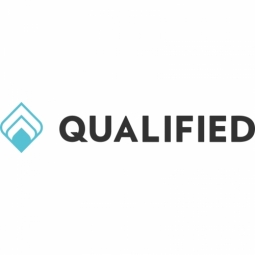Carta Increased Success Rate on Conversations by 900% In Six Weeks and Sourced $4.9M in Pipeline With Qualified

Customer Company Size
Large Corporate
Region
- America
Country
- United States
Product
- Qualified Conversations
- Qualified for Outreach
Tech Stack
- Salesforce
- Slack
- Marketo
- Outreach
Implementation Scale
- Enterprise-wide Deployment
Impact Metrics
- Productivity Improvements
- Customer Satisfaction
- Revenue Growth
Technology Category
- Platform as a Service (PaaS) - Connectivity Platforms
- Analytics & Modeling - Predictive Analytics
Applicable Industries
- Finance & Insurance
Applicable Functions
- Sales & Marketing
- Business Operation
Services
- System Integration
- Training
About The Customer
Carta is a San Francisco-based financial technology company that tracks ownership of shares, options, valuations, and dilutions for over 29,000 startups including Robinhood, Classpass and Rothy’s. In 2021, Carta did $7B in transaction volume and grew their revenue by 70% to $185M. They have a valuation of more than $7.4B and are on Forbes’ 2022 Fintech 50 list. As a leader in the ownership management space, Carta understands the importance of identifying valuable visitors, instantly starting sales conversations, and shaping sales and marketing campaigns. They leveraged Qualified and its suite of pipeline generation products, including Qualified Conversations and Qualified for Outreach, to arm sales reps with actionable data and maximize their sales and marketing efforts. In doing so, Carta was able to drive pipeline and increase their success rate on conversations.
The Challenge
Anna Centrella, Director of Sales Development at Carta, oversees a team of Sales Development Representatives (SDRs) whose primary role is to capture and qualify pipeline for the sales team to convert into revenue. She understands that Carta’s website is the storefront to Carta’s business because it is where buyers come to learn more about their products and solutions. In fact, roughly 30,000 potential buyers visit Carta’s website each month. Anna knew the site could do more to drive pipeline. Initially, Carta was using another solution to power their conversational sales and marketing program. However, it wasn’t providing enough information about who was visiting the site, their purchase intent, or if they fit Carta’s ideal customer profile. At the same time, this solution's passive interactions with site visitors weren’t capturing the critical information needed to generate more pipeline. What’s more, this solution had a brittle integration with Salesforce, Carta’s CRM platform. Data from Salesforce wouldn't pull into the platform in real time so Anna's team had to jump back and forth between the two to get a more complete view of their visitors. Doing so hurt both rep efficiency and the visitor experience. As a result, chat dropoff rates were high and the success rate of reps engaging in actual conversations were low. “We were losing these amazing opportunities when someone was actually engaged and interested,” Anna said. “I felt like we were leaving deals on the table.”
The Solution
Anna turned to Qualified: a set of technologies and processes that help B2B companies generate pipeline quicker. Qualified helps companies identify their most valuable visitors, instantly start sales conversations, shape sales and marketing campaigns, and uncover signals of buying intent. Having used Qualified at a previous company and seeing the power of the platform firsthand, Anna presented a business plan to her Revenue Operations team and persuaded them to make the switch. From kickoff to go-live, Qualified provided Carta with a dedicated Salesforce-certified implementation consultant, Logan, and together they developed the following strategy: Segment website traffic to help sales reps focus on high-priority visitors, including Outreach sequence, high buyer intent, marketing qualified leads, and target accounts. Use Salesforce data to route visitors to the correct account owner. Send Slack alerts to instantly notify sales reps when a visitor from an assigned account is on the site so they can quickly jump in with a personalized greeting. Alert sales reps when Outreach sequence visitors arrive to welcome them with a tailored greeting. Once their program strategy was established, the Carta SDR team was thoroughly trained on Qualified to maximize success. “Qualified hand-held us through the process, which I'm so grateful for. It's been tremendous to see how their input has been helping our team grow,” Anna said. The sales reps also took advantage of Qualified for Outreach since they were already using Outreach for their prospecting efforts. With this integration, reps could prioritize their outbound efforts and instantly greet buyers from an Outreach sequence when they clicked an email link and arrived on the site, delivering a seamless buying experience across channels.
Operational Impact
Quantitative Benefit

Case Study missing?
Start adding your own!
Register with your work email and create a new case study profile for your business.
Related Case Studies.

Case Study
Real-time In-vehicle Monitoring
The telematic solution provides this vital premium-adjusting information. The solution also helps detect and deter vehicle or trailer theft – as soon as a theft occurs, monitoring personnel can alert the appropriate authorities, providing an exact location.“With more and more insurance companies and major fleet operators interested in monitoring driver behaviour on the grounds of road safety, efficient logistics and costs, the market for this type of device and associated e-business services is growing rapidly within Italy and the rest of Europe,” says Franco.“The insurance companies are especially interested in the pay-per-use and pay-as-you-drive applications while other organisations employ the technology for road user charging.”“One million vehicles in Italy currently carry such devices and forecasts indicate that the European market will increase tenfold by 2014.However, for our technology to work effectively, we needed a highly reliable wireless data network to carry the information between the vehicles and monitoring stations.”

Case Study
Safety First with Folksam
The competitiveness of the car insurance market is driving UBI growth as a means for insurance companies to differentiate their customer propositions as well as improving operational efficiency. An insurance model - usage-based insurance ("UBI") - offers possibilities for insurers to do more efficient market segmentation and accurate risk assessment and pricing. Insurers require an IoT solution for the purpose of data collection and performance analysis

Case Study
Smooth Transition to Energy Savings
The building was equipped with four end-of-life Trane water cooled chillers, located in the basement. Johnson Controls installed four York water cooled centrifugal chillers with unit mounted variable speed drives and a total installed cooling capacity of 6,8 MW. Each chiller has a capacity of 1,6 MW (variable to 1.9MW depending upon condenser water temperatures). Johnson Controls needed to design the equipment in such way that it would fit the dimensional constraints of the existing plant area and plant access route but also the specific performance requirements of the client. Morgan Stanley required the chiller plant to match the building load profile, turn down to match the low load requirement when needed and provide an improvement in the Energy Efficiency Ratio across the entire operating range. Other requirements were a reduction in the chiller noise level to improve the working environment in the plant room and a wide operating envelope coupled with intelligent controls to allow possible variation in both flow rate and temperature. The latter was needed to leverage increased capacity from a reduced number of machines during the different installation phases and allow future enhancement to a variable primary flow system.

Case Study
Automated Pallet Labeling Solution for SPR Packaging
SPR Packaging, an American supplier of packaging solutions, was in search of an automated pallet labeling solution that could meet their immediate and future needs. They aimed to equip their lines with automatic printer applicators, but also required a solution that could interface with their accounting software. The challenge was to find a system that could read a 2D code on pallets at the stretch wrapper, track the pallet, and flag any pallets with unread barcodes for inspection. The pallets could be single or double stacked, and the system needed to be able to differentiate between the two. SPR Packaging sought a system integrator with extensive experience in advanced printing and tracking solutions to provide a complete traceability system.

Case Study
Transforming insurance pricing while improving driver safety
The Internet of Things (IoT) is revolutionizing the car insurance industry on a scale not seen since the introduction of the car itself. For decades, premiums have been calculated using proxy-based risk assessment models and historical data. Today, a growing number of innovative companies such as Quebec-based Industrielle Alliance are moving to usage-based insurance (UBI) models, driven by the advancement of telematics technologies and smart tracking devices.
Case Study
Enhancing Security and Compliance in Remitly's Global Money Transfer Service with Fastly
Remitly, an online remittance service, was faced with the challenge of securing its proprietary global transfer network. The company needed a security solution that could meet PCI requirements and protect customers' sensitive transactions through its mobile application. The solution had to be capable of defending against new and emerging attack types without impacting performance. Remitly also had to deal with irregular traffic patterns, such as a sudden spike in account transfers from a small network segment on the Pacific coastline of South America. The company needed to determine in real time whether such traffic indicated an attack or valid requests. A traditional web application firewall (WAF) would not be able to distinguish this traffic, potentially leading to customer frustration if the IP was blacklisted.






